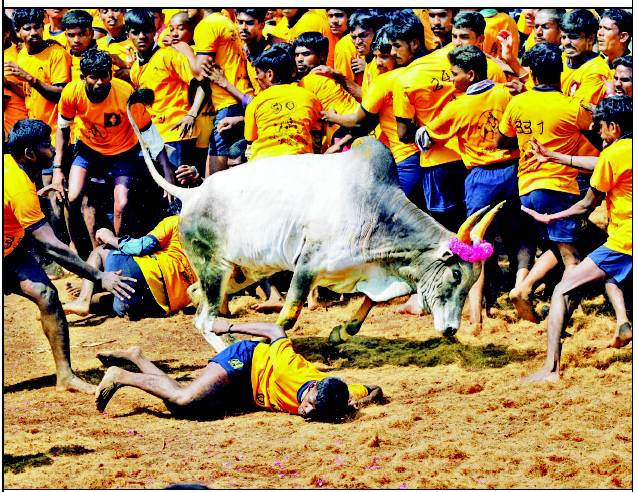Jallikattu
Contents |
Jallikattu
This is a collection of newspaper articles selected for the excellence of their content. |
SC lifts ban on Pongal bullfight
TN wins battle as SC lifts ban on Pongal bullfight
Dhananjay Mahapatra | TNN
January 16, 2008
New Delhi: In a major reprieve to the Tamil Nadu government, Supreme Court on Tuesday reversed its ban and allowed the bull-taming race of ‘jallikattu’ during Pongal festivities this year after the state promised that the animals would not be tortured and steps would be taken to prevent injuries to participants.
However, the court resented the DMK government’s tactics in seeking reversal of its January 11 order, in which it had refused to lift the ban on ‘jallikattu’ terming it as barbaric and inhuman as bulls were tortured, administered chilli powder and local brew to make them charge in an enraged state. The SC did point out that the DMK-led government’s recourse to invoking the religious sentiments of for seeking lifting of the ban did present an obvious contradiction in terms of the Dravidian party’s outright rejection of the “faith” argument in the Ram Setu case. The controversial Sethusamudram project is being also being heard by the SC.
The state’s main argument was that a ban on the 400-yearold traditional event would hurt people’s religious sentiments. But it did not forget to mention that if the ban order was not reversed, people would defy it.
Citing intelligence reports, it said: “In most villages, the people have decided to defy the Supreme Court order and to go ahead with the celebration of ‘jallikattu’ as usual.... This situation would create a major law and order problem in many places during the Pongal festival.”
Appearing for the state, additional solicitor general Gopal Subramaniam tried to focus only on the sentimental issue while distancing himself from the matter contained in the state’s application. But the court’s radar picked up the seriousness of the flaws in the state’s arguments.
“We do not approve of the reasons given by the Tamil Nadu government to seek modification of the January 11 order,” a Bench comprising Chief Justice K G Balakrishnan and Justices R V Raveendran and J M Panchal recorded in its order while permitting holding of ‘jallikattu’ under strict supervision of the district authorities to prevent torture to animals and injury to participants. The invoking of religious sentiments also invited terse comments from the court, which is also adjudicating the controversy relating to the Sethusamudram Channel Project involving dredging of Ram Setu. After the Centre’s affidavit questioning the basis of Ramayan and Lord Ram kicked up a furore, the TN chief minister had also sought to doubt that Ram ever existed.
The Bench said: “We do not know why the TN government is invoking religious sentiments. We wonder what would be their stand in another case pending before us. We do not want to specify which case.” It was crystal clear that the Bench was referring to Ram Setu controversy.
What clinched the issue for the state was Subramaniam’s insistence that the local administrations of each district under the collector had prepared a blueprint under which all animals would be certified by the veterinary staff that they were fit to be allowed to run and that they had not been tortured. Adding a few more ‘don’ts’ to the list of guidelines already put in place by the state government, the Bench said if all these were strictly adhered to the bulls would not be enraged to run in the earmarked arena and would only walk through it.
“If all the safeguards recorded in the order are strictly implemented, there will be no charm left in ‘jallikattu’ as the bulls would only walk through the running arena,” the Bench said.
TRADITION OF SPORT
ORIGIN
Jallikattu has been around for over 400 years. The event was recorded in ancient literature as ‘yeru thaluvudal’ (hugging the bull). Initially, it was a ceremony to select a bridegroom — the successful tamer would get to marry the maiden.
NAME
The name jallikattu is derived from the word ‘salli’ or ‘kasu’ meaning coins and ‘kattu’ meaning bundle/pouch. The pouch, made of yellow cloth, filled with coins, is tied to the bull’s horns. The tamer gets the pouch.
WHY DURING PONGAL
On 3rd day of the four-day-harvest festival, people offer prayers to bulls, cows and other farm animals and then play the customary bull-taming sport. They believe that not playing the sport will displease local deities, including lord Muniswara.
DISTRICTS
The biggest jallikattu, at Alanganallur, has the tourism department’s patronage. The event also takes place in Avaniapuram and Palamedu of Madurai district and in some villages in surrounding districts like Pudukottai, Tiruchirapalli and Thanjavur.
